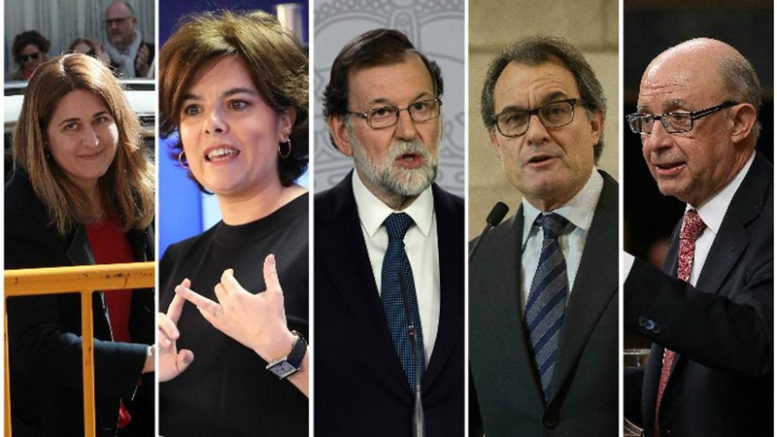Leading Spanish and Catalan politicians took the witness stand on Tuesday and Wednesday to mark the start of a new phase in Spain’s high-profile Supreme Court trial of 12 Catalan pro-independence politicians and activists on charges of rebellion, sedition, disobedience of court orders and misuse of public funds in relation to the October 2017 independence referendum deemed illegal by Spain’s Constitutional Court.
The questioning of witnesses called by the prosecution followed more than a week of questioning of the 12 defendants by prosecutors and their own defense attorneys.
 The questioning of the first of 256 witnesses to be called by the prosecution was highlighted on Wednesday by the appearance in court of former Spanish President Mariano Rajoy, who testified that he was obliged in October 2017 to invoke Article 155 of the Constitution and sack leading Catalan regional government officials in order to restore order following an apparent declaration of independence from Spain by the Catalan Parlament.
The questioning of the first of 256 witnesses to be called by the prosecution was highlighted on Wednesday by the appearance in court of former Spanish President Mariano Rajoy, who testified that he was obliged in October 2017 to invoke Article 155 of the Constitution and sack leading Catalan regional government officials in order to restore order following an apparent declaration of independence from Spain by the Catalan Parlament.
Earlier in the day, former Vice-President Soraya Saenz de Santamaria testified similarly that outbreaks of violence in response to court-ordered police searches and police efforts to halt the referendum necessitated the imposition of Article 155 and suspension of the Catalan government.
The first witness testimonies came after a week in which the defendants’ responses to questions from prosecutors and/or their own defense attorneys reflected a range of defense arguments.
All of the defendants argued in court that there was never any recurrence to violence in organizing protests or responding to police actions in the days leading up to the referendum or on the voting day itself, saying over and again that the activities of pro-independence supporters had been completely “democratic, pacific and festive” in every respect. The issue of whether or not violence was employed will be key to prosecutors’ ability to prove to the court that the charge of rebellion leveled against several of the defendants is warranted.
The defense arguments varied from defendant to defendant, however, with several arguing in court that the trial itself is a political show trial, that they did not recognize the authority of Spain’s Supreme Court to judge them and that they considered themselves political prisoners. Others testified that the 1st October 2017 referendum was not illegal under Spain’s Constitution and therefore no crime was committed in organizing and carrying it out. Still others held the referendum was indeed illegal under the Constitution, but they personally obeyed court orders to disallow the referendum and are therefore not personally guilty of any crime.
On Tuesday, the last two defendants took a slightly different approach: former leader of the pro-independence Omnium Cultural organization Jordi Cuixart admitted disobedience of court rulings disallowing the referendum but said he had done so out of obedience to a higher, democratic calling of what he said was the right of the Catalan people to self-determination. Former Catalan Parlament President Carme Forcadell said in her defense that as head of the parliamentary body she was compelled to allow the referendum because of her obligation to respect the will of the Catalan regional legislature.
► Read More in Spanish at La Vanguardia, El País and El Diario …
► Read More in English at Reuters, The Guardian and El País …
► Click to read more news about the Justice system in Spain …
Check out more news from Spain about:
► Animal Welfare ► Corruption/Transparency ► Discrimination ► Education ► Children’s Rights ► Environment & Sustainability ► Fair Trade & Development Aid ► Healthcare ► Historical Memory ► Housing & Homelessness ► Human Rights ► Labour & Unemployment ► LGBT ► Peace & War ► Politics ► Poverty ► Refugees & Migration ► Technology & Social Enterprise ► Women’s Rights

